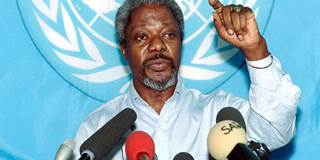Seventeen years ago, the UN, the avatar of international legitimacy and the rule of law, and the US, the embodiment of pragmatic power and force, had a kind of alliance. As we mourn the recent death of Kofi Annan, perhaps we should also mourn that alliance — and, more fundamentally, the decimation of the UN’s global standing.
PARIS – It was the autumn of 2001, sometime between the September 11 terrorist attacks in the United States and US President George W. Bush’s invasion of Afghanistan. I was walking through Venice with Richard C. Holbrooke, who had been the US ambassador to the United Nations under President Bill Clinton. Holbrooke’s mobile phone rang. On the line was then-UN Secretary-General Kofi Annan.
Holbrooke had expected the call. He and Annan spoke with the warm confidence born of their cooperation during Clinton’s second term. Annan, a kind of civilian pope, had forged a partnership with Holbrooke, the master diplomat who had been instrumental in ending the Bosnian War. It was a partnership that both men considered to be essential for global peace and stability.
This cooperative dynamic went beyond Annan and Holbrooke. The UN, as the quintessential symbol of international legitimacy and the rule of law, and the US, as the embodiment of pragmatic power and force, had a kind of alliance. As we mourn the recent death of Annan, perhaps we should also mourn that alliance – and, more fundamentally, the decimation of the UN’s global standing since Annan’s departure in 2007.

PARIS – It was the autumn of 2001, sometime between the September 11 terrorist attacks in the United States and US President George W. Bush’s invasion of Afghanistan. I was walking through Venice with Richard C. Holbrooke, who had been the US ambassador to the United Nations under President Bill Clinton. Holbrooke’s mobile phone rang. On the line was then-UN Secretary-General Kofi Annan.
Holbrooke had expected the call. He and Annan spoke with the warm confidence born of their cooperation during Clinton’s second term. Annan, a kind of civilian pope, had forged a partnership with Holbrooke, the master diplomat who had been instrumental in ending the Bosnian War. It was a partnership that both men considered to be essential for global peace and stability.
This cooperative dynamic went beyond Annan and Holbrooke. The UN, as the quintessential symbol of international legitimacy and the rule of law, and the US, as the embodiment of pragmatic power and force, had a kind of alliance. As we mourn the recent death of Annan, perhaps we should also mourn that alliance – and, more fundamentally, the decimation of the UN’s global standing since Annan’s departure in 2007.